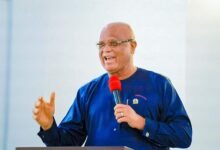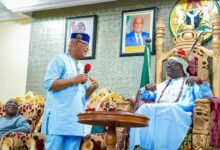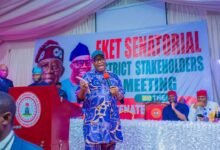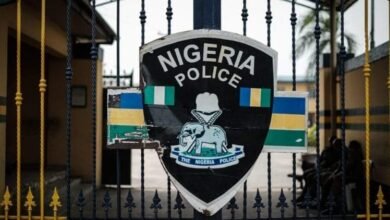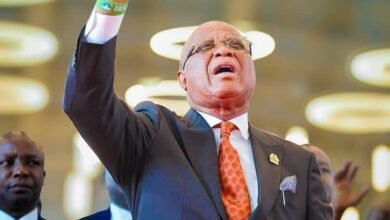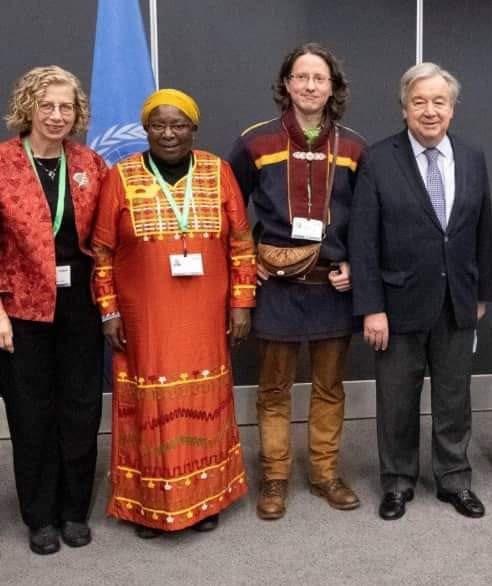
UN, Activists Urge Nations To End Inequalities Against Indigenous People
The Evangelist News Edition, Sunday August 13, 2023. By Adeze Ojukwu
The horrible violations against indigenous people, came to the fore again, at this year’s World’s Indigenous People Day(WIPD). The United Nations(UN), human rights activists and some communities harped on the need to protect the rights of disadvantaged natives, by ending discriminatory practices against them. “Although some countries have begun to rectify their heinous legacy of discriminations against these people, more action is still needed,” UN Secretary-General António Guterres said on Monday.
In his message, to mark the date, the UN chief called for ending the “grievous inequalities” affecting these communities. The date marks the first meeting, in 1982, of the UN Working Group on Indigenous Populations.
The observance took place online on Wednesday, August 9, 2023, with the theme, “Indigenous Youth as Agents of Change for Self-determination.” Guterres, in a web statement said, “centuries-old marginalization and other varying vulnerabilities are some of the reasons why indigenous peoples do not have the same possibilities of access to education, health system, or digital communications.
Violations of the rights of the world’s Indigenous Peoples have become a persistent problem, sometimes because of a historical burden from their colonization backgrounds and others because of the contrast with a constantly changing society.”
Sadly, calls for self-determination in many countries, such as Nigeria, Spain, South American nations among others, are often, violently opposed by many government. Sometimes the leaders of such indigenous peoples are incarcerated, killed or denied justice.
The UN has to wade into such barbaric crimes, which tend to deter indigenes from demanding for their rights or roles in political governance of their countries. In response to this problem, the UN said categorically: “Let’s remember every August 9 that Indigenous Peoples have the right to make their own decisions and carry them out meaningfully and culturally appropriate to them.
According to him, in this context of demand for self-determination, Indigenous youth are working, as agents of change, at the forefront of some of the most pressing crises facing humanity today. “For instance, these young people are harnessing cutting-edge technologies and developing new skills to offer solutions and contribute to a more sustainable, peaceful future for our people and planet.”
According to Dr Guterres their representation and participation in global efforts towards climate change mitigation, peacebuilding, and digital cooperation are crucial for the effective implementation of their rights as indigenous. Hence this year’s event and activities, emphasized the role that indigenous youth must occupy in decision-making, while recognizing their dedicated efforts in climate action, the search for justice for their people, and the creation of an intergenerational connection that keeps their culture, traditions, and contributions alive.”
The anniversary is coming few days ahead of World Youth Day, which is another global celebration to boost prospects and potentials of young people worldwide, amidst the challenges they face in their various societies.
The UN further revealed that “there are an estimated 476 million indigenous peoples in the world living across 90 countries. They make up less than 5 per cent of the world’s population, but account for 15 per cent of the poorest.
They speak an overwhelming majority of the world’s estimated 7,000 languages and represent 5,000 different cultures. Indigenous Peoples are inheritors and practitioners of unique cultures and ways of relating to people and the environment.
They have retained social, cultural, economic and political characteristics that are distinct from those of the dominant societies in which they live. Despite their cultural differences, indigenous peoples from around the world share common problems related to the protection of their rights as distinct peoples.”
Over the years, these locals have sought recognition of their identities, their way of life and their right to traditional lands, territories and natural resources. Yet, throughout history, their rights have been violated, hence they, are arguably, among the most disadvantaged and vulnerable groups of people in the world. Gratuitously, “the international community now recognizes that special measures are required to protect their rights and maintain their distinct cultures and way of life,” the UN chief noted.
It is unfortunate that globally, “47 percent of all indigenous peoples in employment have no education, compared to 17 percent of their non-indigenous counterparts. This gap is even wider for women. More than 86 percent of indigenous peoples, globally, work in the informal economy, compared to 66 percent for their non-indigenous counterparts. Yet they are nearly three times, as likely to be living in extreme poverty compared to their non-indigenous counterparts.”
These natives, hold a unique connection to their lands, cultures, and traditions, which are often threatened by external pressures, including land encroachments, resource extraction and limited recognition of their rights. However, “young Indigenous Peoples are helping to fight back.
They are leaders in the global climate action movement. They advocate justice and equality, celebrate their cultures, advance human rights and raise awareness of Indigenous history and issues around the world,” he added. Several young Indigenous Peoples shared their insights, during a virtual event on Wednesday morning to commemorate the day.
Josefa Tauli from the Ibaloi-Kankanaey Igorot community in the Philippines, a member of the Secretary-General’s Youth Advisory Group on Climate Change, recounted her experiences and barriers that are limiting her people from making an impact.
She called for unity among youths, saying, “no matter how long it takes, a just struggle will bear fruit as long as we work together. I think that we as Indigenous youth all have roles to play in this continuing struggle for the respect of our rights, and in the fight for a just world that lives in harmony with Mother Earth,” she added.
Autumn Adams from the Yakama community in the United States(US) highlighted the importance of learning from previous generations. “I think that is the goal to combine the next generations’ strengths with the teachings of our past generations to create the most equitable future,” she said.
•Ojukwu, a journalist, author and Fellow of Hubert H. Humphrey Fellowship is an advocate for justice, equity and good governance.
* Please send feedback to adeze.ojukwu@gmail.com


